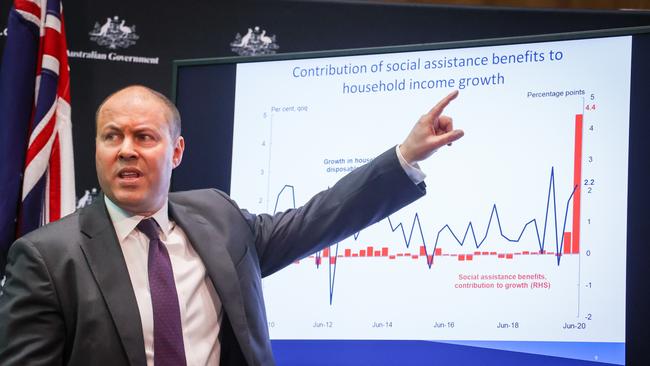Budget: Treasurer Josh Frydenberg must open wallets and set $80bn free
The Morrison government’s October budget must prioritise measures aimed at getting Australians to spend $80bn in precautionary household savings.

The October budget must prioritise measures aimed at getting Australians to spend $80bn in precautionary household savings built up through the COVID-19 recession, economists say, after a collapse in consumption drove the worst quarterly economic contraction on record.
Josh Frydenberg on Wednesday again signalled he was considering bringing forward legislated income tax cuts in the upcoming budget, as part of a five-year plan to reignite the country’s economic potential in after the COVID-19 recession.
Victoria’s second coronavirus wave and intensified restrictions are expected to squash a national recovery in this quarter, with economists and Treasury predicting flat to negative GDP growth over the three months.
With uncertainty around the health crisis and the pace of recovery remaining elevated, PwC chief economist Jeremy Thorpe said the June quarter collapse in household consumption “reinforced that the key criterion in the October budget is giving people the confidence to spend again”.
“Consumers need to be the priority as they drive demand in the economy,” Mr Thorpe said.
He said accelerated income tax cuts — and continued support through JobKeeper and certainty around the level of JobSeeker into 2021 — would help provide that boost to confidence.
A striking feature of the June quarter accounts was that households chose to save a fifth of their income — the highest rate since 1974 and more than three times the savings ratio recorded in the previous quarter.
CBA head of Australian economics Gareth Aird said Australians squirrelled away $42bn in the June quarter, or about 2 per cent of national GDP. Mr Aird said he expected a similar amount to be saved in this quarter, creating a household cash reserve of more than $80bn.
He said bringing forward tax cuts “will help boost demand”.
“I think the case to pull forward income tax relief is quite strong now, given wages growth will be very weak for some time,” Mr Aird said.
Mr Thorpe said he didn’t expect a “reforming budget, because reform involves winners and losers and upsetting the status quo. This time we need to get back to the old status quo”.
But Tax Institute senior tax counsel Robert Deutsch said he “would doubt that advancing the personal income tax cuts would have much more than a marginal effect on consumption”.
“Personal tax cuts do nothing for the unemployed and very little for retirees,” Professor Deutsch said. “It would help a little but would not in my view deliver a significant boost to consumption. In such uncertain times, a large tranche of any such tax relief may also be saved rather than spent, thus defeating the purpose.”
ANU Tax Policy Institute director Robert Breunig said he supported the income tax cuts, but also argued that there were better ways of stimulating consumption in the near future.
“People who have jobs in Australia are not short of money — that’s not the problem,” he said.
He instead advocated using the money to provide a “Christmas bonus” targeted at those who needed were more likely to spend the money, rather than save it.
Ultimately, controlling Victoria’s outbreak and opening the borders would underwrite a consumer-led recovery, he said.



